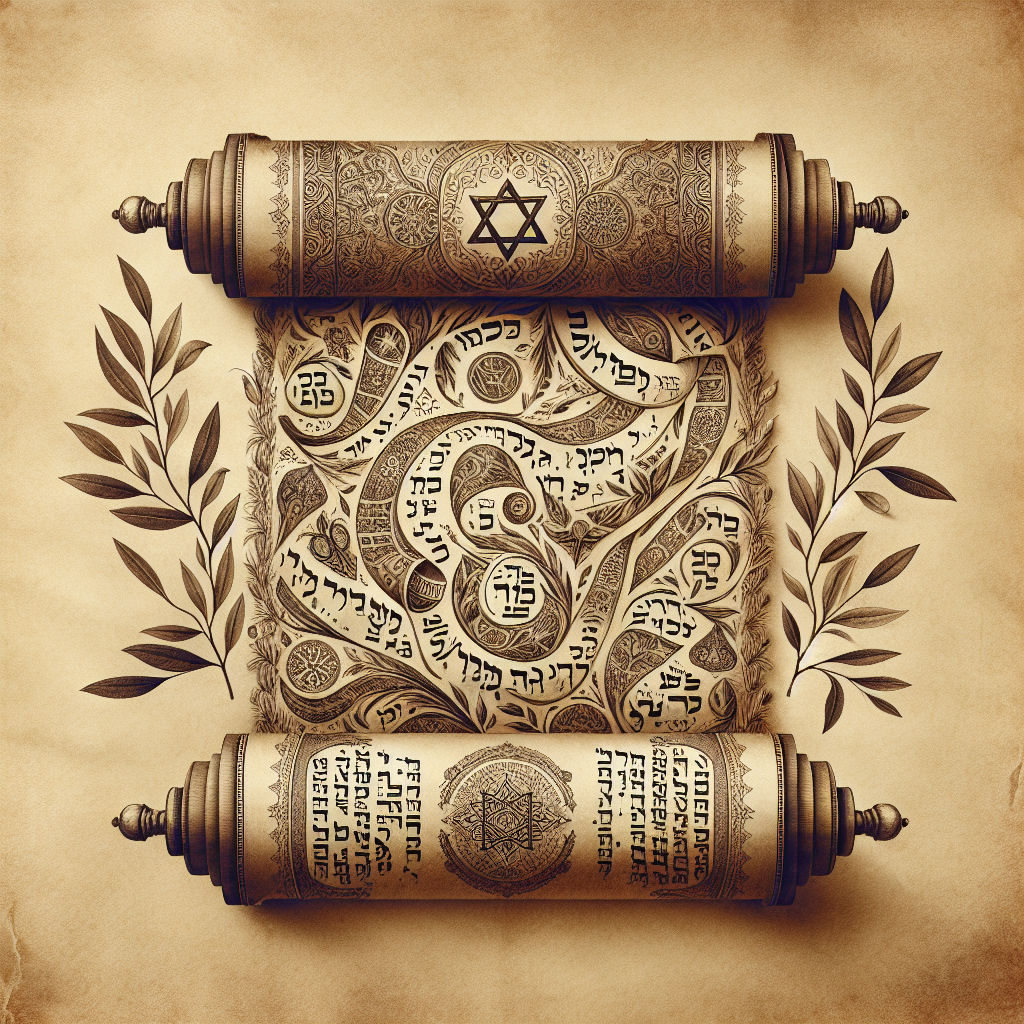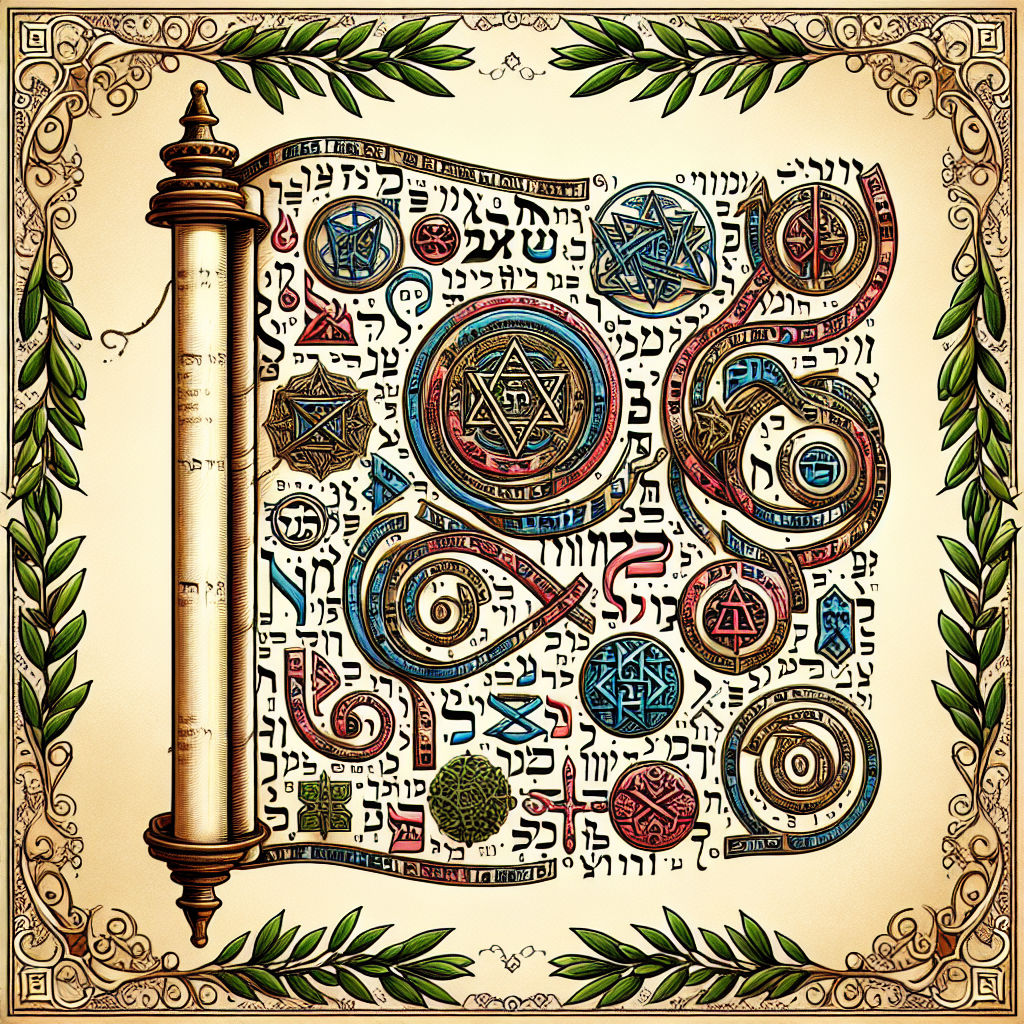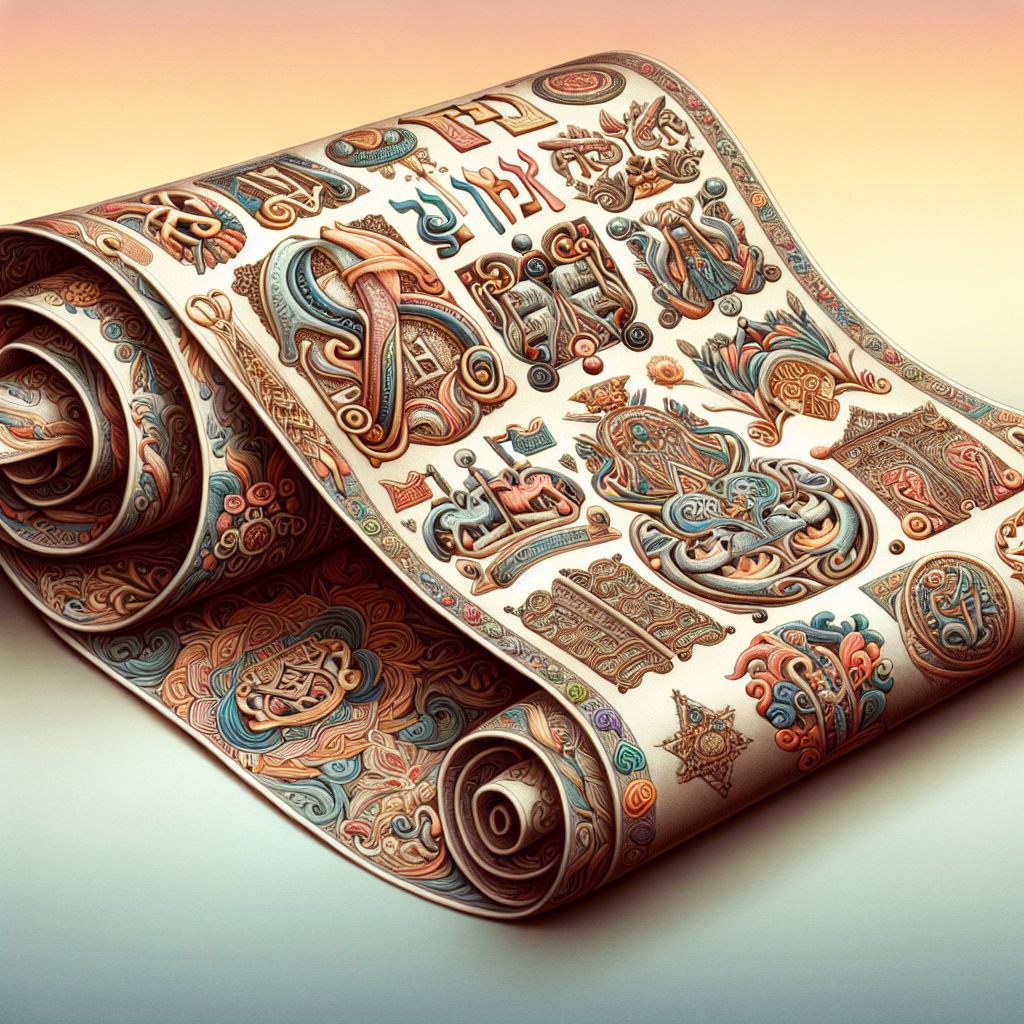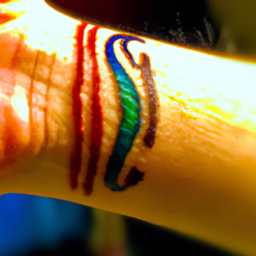“Choosing Your YHWH Hebrew Tattoo: Design Ideas and Meanings”
Introduction to the Significance of YHWH in Hebrew Culture
In the tapestry of Hebrew culture, few threads are as sacred and as enigmatic as the name YHWH, commonly pronounced as Yahweh. This name, known as the Tetragrammaton, is the specific designation for the God of Israel, and it holds a place of profound reverence within Jewish tradition. The significance of YHWH is deeply rooted in the history and spirituality of the Jewish people, and it is considered the most sacred name of God, so much so that it is often not spoken aloud, replaced instead with titles like Adonai (Lord) or HaShem (The Name).
The cultural and spiritual weight of the Tetragrammaton is immense. It is a name that is intertwined with the very identity of the Jewish people and their relationship with the divine. In the Hebrew Bible, the name YHWH is associated with God’s presence, his covenant with Israel, and his attributes of mercy, justice, and righteousness. It is a name that signifies God’s eternal and unchanging nature, as well as his intimate involvement in the lives of his people.
Given this deep reverence, the idea of inscribing YHWH on one’s body through tattoo art carries a multitude of cultural and spiritual implications. Tattoos are permanent marks, and for many, they serve as expressions of identity, belief, or personal narrative. However, when it comes to the sacred name of God, the act of tattooing takes on additional layers of meaning and potential controversy within the context of Jewish faith and practice.
Understanding the Sacredness of the Name
The religious implications of inscribing the name of God on one’s body cannot be overstated. In Jewish thought, the name of God is intrinsically holy and is treated with the utmost respect. This sanctity is reflected in the practices surrounding the name, such as not pronouncing it in vain and the careful handling of texts that contain it. The idea of placing the Tetragrammaton on one’s skin, therefore, raises significant theological and ethical questions.
For those within the Jewish faith, the body is often viewed as a vessel created in the image of God, and it is to be treated with dignity and care. The act of tattooing, particularly with the name of God, can be seen as a desecration of this divine image. Moreover, there is a historical aversion to tattoos within Jewish culture, partly due to the Torah’s prohibition in Leviticus 19:28 against marking the body and also because of the painful associations with forced tattooing during the Holocaust.
For individuals outside the Jewish faith who may be drawn to the aesthetic or conceptual allure of a YHWH tattoo, it is crucial to approach the subject with sensitivity and awareness. The sacredness of the name transcends cultural boundaries, and appropriating such a significant religious symbol without understanding its depth and the potential offense it may cause can be seen as a form of cultural insensitivity or disrespect.
The Legal and Cultural Debate Around YHWH Tattoos
The Jewish community is not monolithic, and opinions about the appropriateness of tattoos, in general, vary widely. Some more liberal streams of Judaism may adopt a more lenient view of tattoos, seeing them as a form of personal expression that can be compatible with a modern, spiritual life. However, many traditionalists and Orthodox authorities maintain a strict stance against tattoos, citing Halacha, or Jewish law, which is derived from the Torah and rabbinic teachings.
The Halachic perspective traditionally interprets the Torah’s prohibition against tattoos as clear and binding. This view is often reinforced by the desire to maintain a distinction between Jewish practices and those of other cultures where tattooing may have been common. In modern times, while some interpretations of Jewish law have evolved with changing societal norms, the prohibition against tattoos remains widely upheld, especially when it comes to the sacred name of God.
The debate extends beyond legal considerations to cultural and emotional ones. For many Jews, tattoos still evoke the traumatic memory of the Holocaust, where tattoos were used as a means of dehumanization and control. The idea of voluntarily marking one’s body, particularly with a symbol as holy as the name of God, can be seen as insensitive to this historical suffering.
In conclusion, the decision to get a YHWH tattoo is not one to be taken lightly. It is a choice that sits at the intersection of personal expression and deep-seated religious values. For those within the Jewish community, it is a matter that requires careful consideration of Halacha, tradition, and personal belief. For those outside the faith, it demands a respectful understanding of the cultural and spiritual significance of the name. Regardless of one’s background, the sacredness of YHWH calls for a thoughtful and informed approach to its use in body art, recognizing the profound resonance it holds within Hebrew culture and beyond.

Design Ideas for YHWH Tattoos
When considering a tattoo that bears the name of God, specifically YHWH, the design aspect holds immense importance due to the profound spiritual significance of the Tetragrammaton. The Hebrew script itself is ancient and carries a weight that transcends mere aesthetics. For those looking to honor their faith or spirituality, the design of a YHWH tattoo should be approached with reverence and thoughtfulness.
The classic Hebrew script is a popular choice for YHWH tattoos, as it directly connects the individual to the traditional representation of God’s name as found in sacred texts. The script is characterized by its distinctive strokes and can be rendered in various styles, from the more ornate to the starkly simple. Each letter in the Tetragrammaton is rich with kabbalistic meaning, and the script should be crafted with precision to preserve its integrity.
Modern typography offers a different approach, allowing for a contemporary twist on the ancient name. Some may opt for a minimalist design that focuses on the shape and form of the letters, creating a subtle yet powerful statement. This style can resonate with those who seek a connection with the divine that aligns with a more modern aesthetic.
Abstract designs provide another avenue for those wishing to embody the essence of YHWH in a less literal way. Symbols such as the burning bush, the Star of David, or other iconography from Jewish tradition can be integrated into the tattoo to complement the meaning of YHWH. These elements can serve as a visual metaphor for the presence of God and the profound mystery that the name represents.
When creating a YHWH tattoo, it’s essential to consider the balance between personal expression and the respect due to the sacred name. The design should be a personal reflection of one’s faith or spiritual journey, yet mindful of the cultural and religious significance that the name YHWH holds. It’s not merely an adornment but a statement of belief and identity.
Placement Considerations for Your Tattoo
The placement of a YHWH tattoo is as crucial as the design itself. In many spiritual traditions, the body is viewed as a temple, and where a tattoo is placed on the body can have symbolic meaning. For a tattoo that carries the name of God, finding a location that honors the sanctity of the name while fitting personal aesthetics is a delicate balance.
One consideration is visibility. Some may choose a discreet location, keeping the sacred name private and close, as a personal reminder of their faith. Common areas for more private tattoos include the chest, near the heart, or on the upper thigh. Others may wish to wear the name openly as a testament to their beliefs and a way to inspire conversations about their faith. In such cases, the forearm, wrist, or shoulder can be appropriate.
Another aspect to consider is the cultural and religious implications of the body part chosen for the tattoo. In some interpretations of Jewish law, certain body parts may be considered more respectful than others for placing tattoos. It’s important to research and understand these nuances, especially if the individual is of Jewish heritage or holds the cultural aspects of the tradition in high regard.
The size and orientation of the tattoo also play a role in its placement. A larger design may require a more expansive canvas, such as the back or the upper arm, while a smaller, more delicate rendering of YHWH could be suited to the inner wrist or ankle. The orientation should ensure that the name is readable and presented with dignity.
The Importance of Accurate Translation and Script
Accuracy in the translation and script of a YHWH tattoo cannot be overstated. Hebrew is a language where each character and diacritical mark is significant, and a small error can lead to a misrepresentation of the sacred name. Ensuring the correct Hebrew spelling of YHWH is paramount, as the Tetragrammaton is composed of specific Hebrew letters: Yod, He, Vav, He. Any deviation not only alters the appearance but can also change the meaning and is considered disrespectful.
Consulting with Hebrew-speaking individuals or religious scholars is advisable to guarantee the accuracy of the script. This step is crucial for those who do not have a background in Hebrew language or Jewish tradition. A knowledgeable consultant can provide guidance on the proper formation of the letters and the traditional ways in which they are represented.
The script should be written in a way that honors the tradition from which it comes. This means paying attention to the calligraphic style of Hebrew writing, ensuring that the letters are formed correctly and that they flow together as they would in a sacred text. The font or handwriting chosen for the tattoo should be vetted for accuracy by someone familiar with Hebrew script.
When selecting a tattoo artist, it’s important to choose someone experienced with Hebrew script and who understands the cultural sensitivity of the task at hand. The artist should be able to demonstrate a portfolio of previous work with Hebrew to ensure they can produce clean, precise lines that honor the integrity of the script.
In conclusion, a YHWH tattoo is more than just body art; it’s a profound expression of faith and spirituality. The design, placement, and script all play integral roles in ensuring that the tattoo is a respectful and accurate representation of the wearer’s beliefs. By carefully considering these aspects, individuals can create a tattoo that not only holds personal significance but also pays homage to the sacred tradition from which the name YHWH originates.

Finding the Right Tattoo Artist
When it comes to inscribing something as profound and sacred as the name YHWH on your body, the importance of choosing the right tattoo artist cannot be overstated. This decision is not merely about aesthetics; it’s about cultural sensitivity, accuracy, and respect for the tradition from which the sacred name originates.
The first step in selecting an artist is to look for someone who has experience with Hebrew script. Hebrew is a complex language with characters that may look similar to the untrained eye but have vastly different meanings. An artist who is familiar with the language will be more likely to accurately reproduce the Tetragrammaton, ensuring that the tattoo is not only beautiful but also correct.
It’s also crucial to find an artist who understands the cultural sensitivity surrounding a YHWH tattoo. This is particularly important if you are not of Jewish faith yourself. The artist should be someone who respects the significance of the name and is willing to engage in a dialogue about why you want this tattoo and how it will be perceived.
When researching potential artists, don’t hesitate to ask for a portfolio of their previous work. Look for clean, precise lines and ask if they have experience with religious or culturally significant tattoos. It’s also a good idea to read reviews and testimonials from other clients to gauge their satisfaction with the artist’s work and professional conduct.
Once you’ve narrowed down your options, schedule consultations with the artists. This is your opportunity to discuss your vision for the tattoo, as well as any concerns you might have. A reputable artist will be open to your ideas and offer suggestions to ensure that the final design is something you’ll be happy with for years to come.
Remember, the right artist will prioritize your comfort and confidence in the process. They will maintain a clean and safe environment, use sterilized equipment, and follow all health and safety regulations to ensure your well-being during and after the tattooing process.
Pre-Tattoo Considerations and Preparations
Before you commit to getting a YHWH tattoo, it’s essential to engage in deep personal reflection. Consider the reasons behind your decision and how it aligns with your spiritual beliefs or cultural identity. Discussing your intentions with loved ones or members of your spiritual community can provide valuable insight and help you gauge the potential impact of your choice.
Once you’ve made the decision to proceed, there are several practical steps to take. First, ensure that you are in good health before getting tattooed. This means being well-rested, hydrated, and free from any skin conditions in the area where you plan to get the tattoo. It’s also advisable to avoid alcohol and certain medications that may thin your blood for at least 24 hours before your appointment.
Next, consider the timing of your tattoo. You’ll need to allow for adequate healing time, so it’s best not to schedule your session immediately before a vacation, swimming, or sun exposure, as these can all negatively affect the healing process.
On the day of your appointment, wear comfortable clothing that allows easy access to the area where you’ll be getting the tattoo. Bring a valid ID and be prepared to fill out consent forms. It’s also a good idea to eat a substantial meal beforehand to maintain your blood sugar levels.
Aftercare and Maintaining the Integrity of Your Tattoo
Proper aftercare is crucial for ensuring that your YHWH tattoo heals well and maintains its integrity over time. Your tattoo artist will provide you with specific instructions, which you should follow meticulously. Common guidelines include keeping the tattoo clean and moisturized, avoiding submerging it in water, and not picking at any scabs that may form.
In the first few days after getting your tattoo, you may experience redness, swelling, and discomfort. These are normal reactions, but if you notice any signs of infection, such as excessive pain, pus, or fever, seek medical attention immediately.
As your tattoo heals, it’s important to protect it from the sun. UV rays can fade the ink and damage the skin. Once healed, apply a high-SPF sunscreen to the tattoo whenever it’s exposed to sunlight. This will help keep the colors vibrant and the lines sharp.
Long-term care also involves maintaining the skin’s overall health. Keep the area moisturized, stay hydrated, and exfoliate gently to remove dead skin cells. This will help your tattoo look its best for years to come.
In conclusion, getting a YHWH tattoo is a decision that carries significant weight, both personally and culturally. By finding the right tattoo artist, preparing thoroughly for the process, and following diligent aftercare, you can ensure that your tattoo not only honors the sacred name it represents but also remains a source of pride and reflection throughout your life.

Reflecting on the Personal and Communal Impact of a YHWH Tattoo
In the realm of body art, few symbols carry as much profound significance as the Tetragrammaton, YHWH, the ineffable name of God in the Hebrew tradition. For those considering a YHWH tattoo, the decision extends far beyond aesthetics and enters the domain of spiritual identity and cultural respect. It is a choice that should be made with deep introspection, not only because of its personal meaning but also due to the potential impact on the community and one’s spiritual journey.
The personal implications of a YHWH tattoo are immense. For believers, the act of inscribing the sacred name of God onto their skin can be seen as a permanent declaration of faith, a constant reminder of their spiritual commitments, and a symbol of divine protection. However, this is not a step to be taken lightly. The Hebrew Bible speaks of the name of God with great reverence, suggesting that it is not to be used frivolously or without due consideration. Therefore, individuals must reflect on their motives and the depth of their understanding and respect for the tradition from which this sacred name originates.
Moreover, the decision to get a YHWH tattoo should involve contemplation of one’s future. Tattoos are, by their nature, enduring. As life unfolds, personal beliefs and circumstances can evolve. It is crucial to consider how the tattoo will resonate with the individual’s future self and whether it will remain a source of pride or become a point of regret.
The communal impact of a YHWH tattoo is equally significant. Within the Jewish community, there are diverse opinions on tattoos. Traditional Jewish law, or Halacha, generally prohibits tattoos, and this has historically influenced Jewish cultural attitudes towards body art. While modern perspectives vary, with some more liberal streams of Judaism adopting a more lenient stance, it is still a sensitive topic. A non-Jewish individual getting a YHWH tattoo may be seen as appropriating a sacred element of Jewish culture, which can lead to discomfort or offense within the community.
Furthermore, the visibility of a YHWH tattoo can influence social interactions. It can spark dialogue, curiosity, and sometimes debate. Those with the tattoo may find themselves in the position of explaining their choice and its significance, not only to those within their faith community but also to people of other beliefs or those with no religious affiliation. This can be an opportunity for education and intercultural exchange, but it also requires a readiness to engage with a wide range of reactions, from admiration to criticism.
The responsibility that comes with wearing a YHWH tattoo is substantial. It is not merely a personal symbol; it is a representation of a millennia-old tradition that is held sacred by millions. Wearers of such tattoos should be prepared to honor the sanctity of the name in their actions and interactions. The tattoo becomes a part of their identity, and as such, it should reflect the values and reverence associated with the name YHWH.
In conclusion, the decision to get a YHWH tattoo is one that should be approached with solemnity and careful consideration. It is a choice that has the power to affect not only the individual but also the broader community. Those who choose to bear the name of God on their skin carry a profound responsibility to uphold the dignity and respect that the symbol demands. It is a path that can enrich one’s spiritual journey, but it must be walked with awareness and a deep sense of commitment to the cultural and religious heritage from which the sacred name arises.
